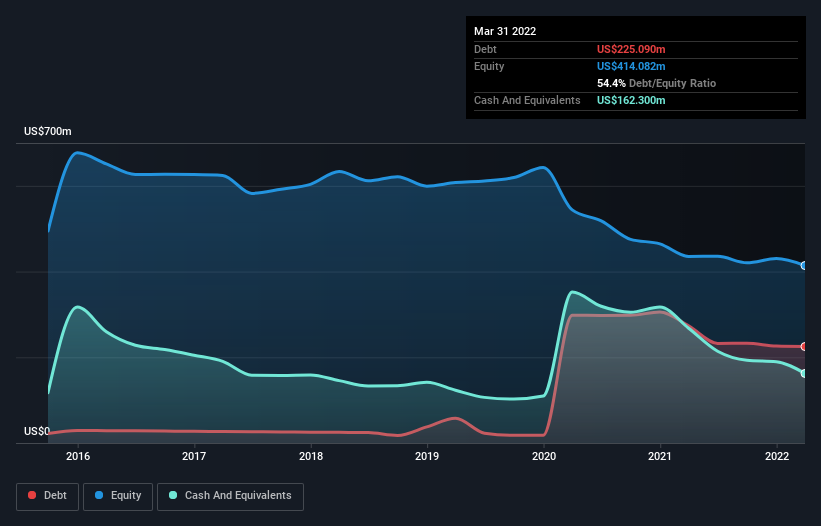
Some say volatility, rather than debt, is the best way to think about risk as an investor, but Warren Buffett famously said that 'Volatility is far from synonymous with risk.' So it seems the smart money knows that debt - which is usually involved in bankruptcies - is a very important factor, when you assess how risky a company is. We can see that IMAX Corporation (NYSE:IMAX) does use debt in its business. But the real question is whether this debt is making the company risky.
What Risk Does Debt Bring?
Generally speaking, debt only becomes a real problem when a company can't easily pay it off, either by raising capital or with its own cash flow. Ultimately, if the company can't fulfill its legal obligations to repay debt, shareholders could walk away with nothing. However, a more common (but still painful) scenario is that it has to raise new equity capital at a low price, thus permanently diluting shareholders. Of course, debt can be an important tool in businesses, particularly capital heavy businesses. The first thing to do when considering how much debt a business uses is to look at its cash and debt together.
View our latest analysis for IMAX
How Much Debt Does IMAX Carry?
As you can see below, IMAX had US$225.1m of debt at March 2022, down from US$273.3m a year prior. On the flip side, it has US$162.3m in cash leading to net debt of about US$62.8m.

How Healthy Is IMAX's Balance Sheet?
According to the last reported balance sheet, IMAX had liabilities of US$99.1m due within 12 months, and liabilities of US$338.9m due beyond 12 months. Offsetting these obligations, it had cash of US$162.3m as well as receivables valued at US$210.2m due within 12 months. So its liabilities total US$65.4m more than the combination of its cash and short-term receivables.
Of course, IMAX has a market capitalization of US$995.5m, so these liabilities are probably manageable. Having said that, it's clear that we should continue to monitor its balance sheet, lest it change for the worse.
In order to size up a company's debt relative to its earnings, we calculate its net debt divided by its earnings before interest, tax, depreciation, and amortization (EBITDA) and its earnings before interest and tax (EBIT) divided by its interest expense (its interest cover). Thus we consider debt relative to earnings both with and without depreciation and amortization expenses.
Given net debt is only 1.4 times EBITDA, it is initially surprising to see that IMAX's EBIT has low interest coverage of 1.9 times. So one way or the other, it's clear the debt levels are not trivial. Notably, IMAX made a loss at the EBIT level, last year, but improved that to positive EBIT of US$8.2m in the last twelve months. The balance sheet is clearly the area to focus on when you are analysing debt. But it is future earnings, more than anything, that will determine IMAX's ability to maintain a healthy balance sheet going forward. So if you're focused on the future you can check out this free report showing analyst profit forecasts.
Finally, while the tax-man may adore accounting profits, lenders only accept cold hard cash. So it is important to check how much of its earnings before interest and tax (EBIT) converts to actual free cash flow. Over the last year, IMAX saw substantial negative free cash flow, in total. While investors are no doubt expecting a reversal of that situation in due course, it clearly does mean its use of debt is more risky.
Our View
While IMAX's interest cover makes us cautious about it, its track record of converting EBIT to free cash flow is no better. But its not so bad at managing its debt, based on its EBITDA,. Taking the abovementioned factors together we do think IMAX's debt poses some risks to the business. So while that leverage does boost returns on equity, we wouldn't really want to see it increase from here. In light of our reservations about the company's balance sheet, it seems sensible to check if insiders have been selling shares recently.
Of course, if you're the type of investor who prefers buying stocks without the burden of debt, then don't hesitate to discover our exclusive list of net cash growth stocks, today.
New: AI Stock Screener & Alerts
Our new AI Stock Screener scans the market every day to uncover opportunities.
• Dividend Powerhouses (3%+ Yield)
• Undervalued Small Caps with Insider Buying
• High growth Tech and AI Companies
Or build your own from over 50 metrics.
Have feedback on this article? Concerned about the content? Get in touch with us directly. Alternatively, email editorial-team (at) simplywallst.com.
This article by Simply Wall St is general in nature. We provide commentary based on historical data and analyst forecasts only using an unbiased methodology and our articles are not intended to be financial advice. It does not constitute a recommendation to buy or sell any stock, and does not take account of your objectives, or your financial situation. We aim to bring you long-term focused analysis driven by fundamental data. Note that our analysis may not factor in the latest price-sensitive company announcements or qualitative material. Simply Wall St has no position in any stocks mentioned.
About NYSE:IMAX
IMAX
Operates as a technology platform for entertainment and events worldwide.
Adequate balance sheet with moderate growth potential.
Similar Companies
Market Insights
Community Narratives


